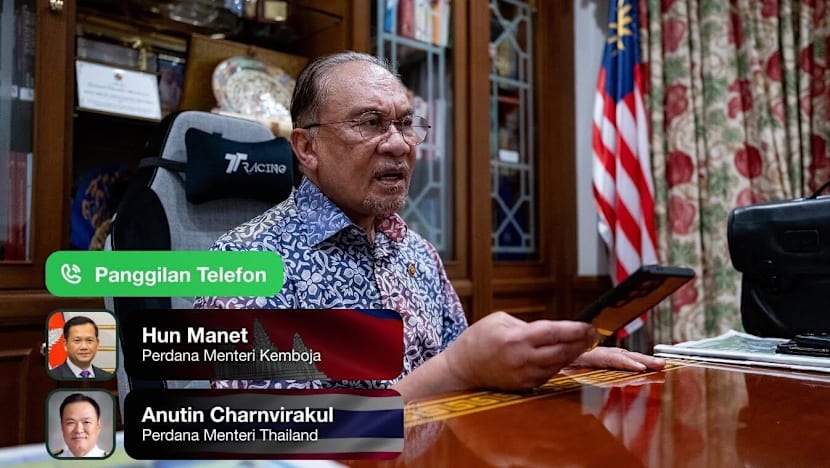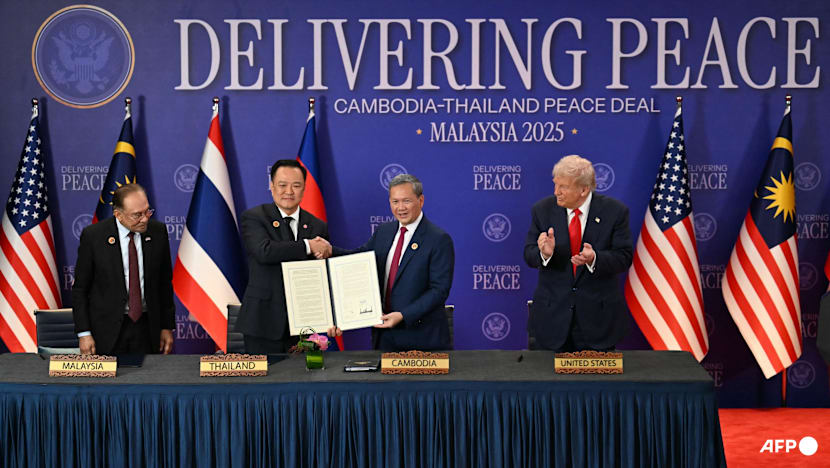Malaysia offers to host new peace talks as Thai-Cambodia border tensions flare
Malaysia’s Foreign Minister Mohamad Hasan said talks between the two countries are “expected to be held soon”, possibly in Kuala Lumpur.

Malaysia Prime Minister Anwar Ibrahim said he spoke on the phone with Thai Prime Minister Anutin Charnvirakul and Cambodian Prime Minister Hun Manet. (Photo: Facebook/Anwar Ibrahim)
KUALA LUMPUR: Malaysia has offered to host fresh peace talks to defuse renewed border tensions between Thailand and Cambodia, saying both countries’ leaders are committed to a peaceful resolution.
The proposal, made by Malaysia Prime Minister Anwar Ibrahim and Foreign Minister Mohamad Hasan on Thursday (Nov 13), comes despite Thai Prime Minister Anutin Charnvirakul saying his government would act solely in Thailand’s interest “without (the need) to deliberate or ask” for anyone’s permission.
Thailand and Cambodia have traded accusations of fresh border clashes this week.
On Monday, Thailand said it was suspending the implementation of a peace agreement with Cambodia after a landmine blast injured two Thai soldiers near the border.
Cambodia on Thursday evacuated hundreds of people from a village along its disputed border with Thailand, a day after one of its residents was reported killed when shooting between the two nations broke out there.
On Friday, Thailand said that the landmine explosion will be investigated by ASEAN observers, after Malaysia's foreign minister said a regional team had reported that mines found at the site of the incident were new.
Established under the peace agreement, the observer team is made up of military officials from ASEAN to ensure Thailand and Cambodia follow through and de-escalate tensions.
Another team of observers is scheduled on Friday to conduct an on-site investigation at a disputed border area where cross-border shooting occurred on Tuesday, when at least one person in Cambodia was killed and three others injured.
Cambodia said Thai troops had opened fire first, while the Thai military said Cambodia initially fired shots and Thai soldiers fired warning shots in response.
In a Facebook post on Thursday night, Anwar said he spoke on the phone with Anutin and Cambodian Prime Minister Hun Manet.
“Both leaders … reaffirmed their commitment to pursuing a peaceful resolution, in line with the understandings agreed under the Kuala Lumpur Peace Accord,” Anwar wrote, without specifying when he spoke to his Thai and Cambodian counterparts.
The Kuala Lumpur Peace Accord, which was also witnessed by United States President Donald Trump during the Association of Southeast Asian Nations (ASEAN) Summit in Kuala Lumpur last month, was meant to secure a lasting end to hostilities following border clashes in July that killed at least 43 people and displaced more than 300,000 civilians on both sides.

“I reiterated Malaysia’s position that the friendship and ceasefire between both countries must be further strengthened in accordance with the agreement concluded in Kuala Lumpur last month,” added Anwar, whose country is this year’s ASEAN chair.
“I also conveyed Malaysia’s readiness to continue playing our role as a facilitator in charting this path towards peace.”
Earlier, Foreign Minister Mohamad Hasan said that talks between the two countries are “expected to be held soon”, possibly in Kuala Lumpur.
“They have contacted us. Cambodia has requested for the talk to be held in Kuala Lumpur and similarly with Thailand, who has requested that we continue with our effort to preserve the ceasefire,” said Mohamad on Thursday, as quoted by news agency Bernama.
Cambodian PM Hun Manet has said Wednesday’s shooting occurred after Thai forces engaged in "numerous provocative actions for many days with the objective of instigating confrontations". He added Cambodia would still honour the ceasefire terms.
Anutin said on Wednesday that his government is unafraid of possible retaliatory measures from the US, and would prioritise national interests and public safety over trade concerns, even if the US were to raise punitive tariffs on Thai goods, reported local media.
“I no longer care about trade and tariff negotiations,” he said, as quoted by The Nation.
“If we can’t sell our goods to one country, we will turn to others. The private sector must cooperate. How can we rest our future on just one country?”
“It’s fine if they (the US) use tax measures to pressure, other countries face the same. If US tariffs on our goods rise to 100 per cent, the ones to suffer will be their own buyers. We must support local industries and raise our competitiveness to survive,” added Anutin, as quoted by The Nation.
The Southeast Asian neighbours have contested sovereignty for more than a century over undemarcated points along their 817km land border, first mapped in 1907 by France when it ruled Cambodia as a colony.
The border tensions erupted into five days of fighting in July, when at least 48 people were killed and an estimated 300,000 temporarily displaced.
Landmine blasts along disputed border areas were among the catalysts for the clashes, with at least seven Thai soldiers severely injured in mine-related incidents since Jul 16.
Some of these mines were likely newly laid, Reuters reported in October, based on expert analysis of material shared by Thailand's military.
Thailand and Cambodia agreed on an initial truce in late July after intervention by Trump, as well as Chinese diplomats and Anwar.
The new joint declaration signed in October, which the White House put up on its website, includes pledges to remove “heavy and destructive weapons and equipment” from the border, refrain from “disseminating harmful rhetoric” and implement “humanitarian de-mining in the border areas”.
Under the declaration, Thailand would release 18 Cambodian soldiers it has held in captivity for the past few months.
Following the signing, Cambodia's defence ministry said it was withdrawing heavy and destructive weapons from its border with Thailand.
While Trump and Anwar referred to October’s agreement as a peace deal or agreement, the document signed by Hun Manet and Anutin is officially titled a “joint declaration”.
Asked in October if the agreement could be categorised as a “peace deal”, Thailand's foreign minister Sihasak Phuangketkeow said: “I would call it a pathway to peace.”
Both Anutin and Hun Manet had previously lauded Anwar's role in brokering peace between Thailand and Cambodia in efforts to uphold ASEAN unity.














